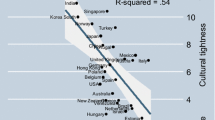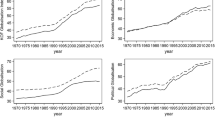Abstract
We empirically investigate the role of cultural values on the occurrence of the global financial crisis. We use data based on Hofstede (Culture’s consequences: comparing values, behaviors, institutions and organizations across nations, 2001) cultural values indexes and employ two econometric approaches, the self-organizing maps and logit, in a panel set of 38 developed and developing countries. We find that culture has a statistically and economically significant effect on the occurrence of the global financial crisis of 2007–2009. The relationship between cultural factors and the crisis occurrence remains strong when we consider control variables representing different sectors of the economy.
Similar content being viewed by others
Notes
The data is available upon request.
Note that we exclude, from the logit estimation, two explanatory variables (Broad Money/GDP and NPL/TL) found to be significant in the SOM analysis, due to their high correlation with domestic credit to private sector over GDP (see Table 7 in Appendix).
There are other factors that may affect this risk-taking behavior such as legal, institutional, and social environment (see Aktaruzzaman and Farooq 2020).
References
Abiad, A. G. (2003). Early Warning Systems: A survey and a Regime-Switching approach. IMF Working Paper, 03–32, Washington, DC.
Ait-Sahalia, Y., Andritzky, J., Jobst, A., Nowakand, S., & Tamirisa, N. (2010). Market response to policy initiatives during the global financial crisis. NBER Working Paper, 15809, Cambridge, MA.
Aktaruzzaman, K., & Farooq, O. (2020). Cultural fractionalization and informal finance: Evidence from Indian firms. Eurasian Economic Review, 10, 661–679.
Ari, A. (2012). Early warning systems for currency crises: The Turkish case. Economic Systems, 36(3), 391–410.
Ari, A., & Cergibozan, R. (2016). A comparison of currency crisis dating methods: Turkey 1990–2014. Montenegrin Journal of Economics, 12(3), 19–37.
Ashraf, B. N., Zheng, C., & Arshad, S. (2016). Effects of national culture on bank risk-taking behavior. Research in International Business and Finance, 37, 309–326.
Benassy-Quere, A., Coeure, B., Jacquetand, P., & Pisani-Ferry, J. (2009). The crisis: Policy lessons and policy challenges. CEPII Working Paper, 2009–2028, Paris, France.
Berger, A. N., Li, X., Morris, C. S., & Roman, R. A. (2021). The effects of cultural values on bank failures around the world. Journal of Financial and Quantitative Analysis, 56(3), 945–993.
Berkmen, S. P., Gaston Gelos, G., Rennhack, R., & Walsh, J. P. (2012). The global financial crisis: Explaining cross-country differences in the output impact. Journal of International Money and Finance, 31, 42–59.
Beugelsdijk, S., & Maseland, R. (2011). Culture in Economics. History, Methodological Reflections, and Contemporary Applications. Cambridge, UK: Cambridge University Press.
Bussiere, M. (2013). Balance of payment crises in emerging markets: How early were the ‘early’ warning signals? Applied Economics, 45(12), 1601–1623.
Bussiere, M., & Fratzscher, M. (2006). Towards a new early warning system of financial crises. Journal of International Money and Finance, 25(6), 953–973.
Caprio, G., D’Apice, V., Ferri, G., & Puopolo, G. W. (2014). Macro financial determinants of the great financial crisis: Implications for financial regulation. Journal of Banking and Finance, 44, 114–129.
Claessens, S. M. A., & Kose, and M. E. Terrones,. (2010). The global financial crisis: How similar? How different? How costly? Journal of Asian Economics, 21, 247–264.
Demir, C., & Cergibozan, R. (2018). Determinants of patent protection regimes: A self-organizing map approach. Review of Economic Perspectives, 18(3), 261–283.
Elias, J. (2004). Fashioning inequality: The multinational company and gendered employment in a globalizing world. Burlington, VT: Ashgate.
Esquivel, G., & Larrain, F. (2000). Explaining currency crises. El Trimestre Economico, 67, 191–237.
Feldkircher, M. (2014). The determinants of vulnerability to the global financial crisis 2008 to 2009: Credit growth and other sources of risk. Journal of International Money and Finance, 43, 19–49.
Frankel, J. A., & Saravelos, G. (2012). Can leading indicators assess country vulnerability? Evidence from the 2008–2009 global financial crisis. Journal of International Economics, 87(2), 216–231.
Griffin, P. (2012). Gendering global finance: Crisis, masculinity, and responsibility. Men and Masculinities, 16(1), 9–34.
Hofstede, G. (2001). Culture’s Consequences: Comparing Values, Behaviors, Institutions and Organizations Across Nations. Beverly Hills, CA: Sage.
Kanagaretnam, K., Lim, C. Y., & Lobo, G. J. (2011). Effects of national culture on earnings quality of banks. Journal of International Business Studies, 42(6), 853–874.
Kohonen, T. (1982). Self-organized formation of topologically correct feature maps. Biological Cybernetics, 66, 59–69.
Kohonen, T. (2001). Self-organizing maps. New York: Springer-Verlag.
Laeven, L., & Valencia, F. (2013). Systemic banking crises database. IMF Economic Review, 61(2), 225–270.
Lane, P. R., & Milesi-Ferretti, G. M. (2011). The cross-country incidence of the global crisis. IMF Economic Review, 59, 11–110.
Mixa, M. W., & Vaiman, V. (2015). Individualistic vikings: Culture, economics and Iceland. Icelandic Review of Politics and Administration, 11(2), 355–374.
Mostafa, M. M. (2010). Clustering the ecological footprint of nations using Kohonen’s self-organizing maps. Expert Systems with Applications, 37(4), 2747–2755.
North D (1990) Institutions, Institutional Change and Economic Performance, Cambridge University Press, Cambridge, UK
Obstfeld, O., Shambaugh, J. C., & Taylor, A. M. (2009). Financial instability, reserves, and central bank swap lines in the panic of 2008. American Economic Review: Papers and Proceedings, 99(2), 480–486.
Rupert, M. (2003). Globalizing common sense: A Marxian-Gramscian (Re-)Vision of the politics of governance/resistance. Review of International Studies, 29, 181–198.
Sarlin, P. (2011). “Sovereign Debt Monitor: A Visual Self-Organizing Maps Approach”, Presented at IEEE Symposium on Computational Intelligence for Financial Engineering and Economics (CIFEr). France.
Sarlin, P., & Peltonen, T. A. (2013). Mapping the state of financial stability. Journal of International Financial Markets, Institutions and Money, 26, 46–76.
Vesanto, J., Himberg, J., Alhoniemi, E., & Parhankangas, J. (2000). SOM toolbox for Matlab 5. Technical Report, 57, 2.
Funding
This study was funded by Istanbul Medeniyet University Scientific Research Projects Office (Grant number S-GAP-2017-1022).
Author information
Authors and Affiliations
Corresponding author
Ethics declarations
Conflict of interest
The authors declare that they have no conflict of interest.
Additional information
Publisher's Note
Springer Nature remains neutral with regard to jurisdictional claims in published maps and institutional affiliations.
Rights and permissions
About this article
Cite this article
Baltaci, A., Cergibozan, R. & Ari, A. Cultural values and the global financial crisis: a missing link?. Eurasian Econ Rev 12, 507–529 (2022). https://doi.org/10.1007/s40822-022-00208-6
Received:
Revised:
Accepted:
Published:
Issue Date:
DOI: https://doi.org/10.1007/s40822-022-00208-6










